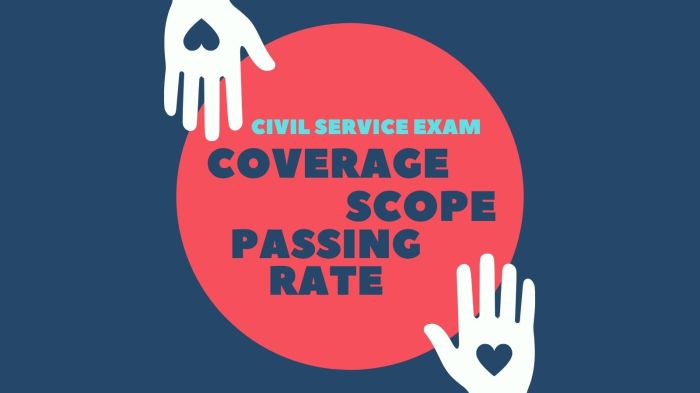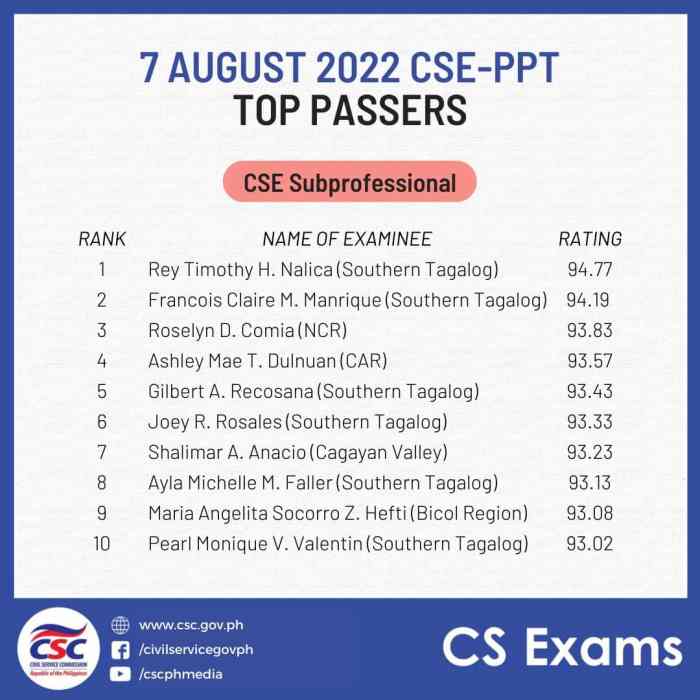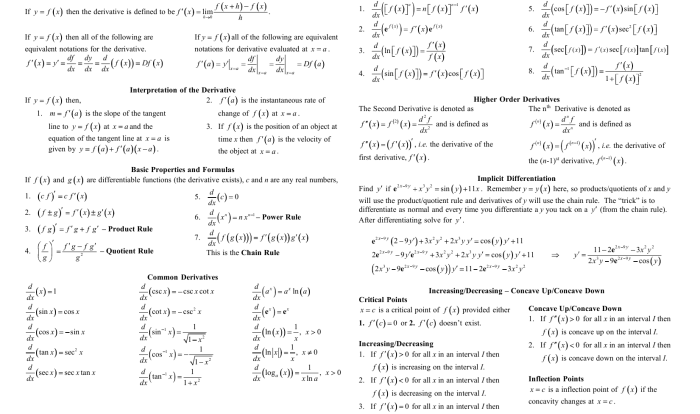Pass rate of cnsc exam – Unveiling the secrets to conquer the CNSA exam, this comprehensive guide delves into the intricacies of pass rates, providing invaluable insights and actionable strategies to maximize your chances of success.
Navigating the complexities of exam preparation, this discourse explores the historical trends, influential factors, and effective techniques that have shaped the pass rates of the CNSA exam over time.
Factors Influencing Pass Rate

The pass rate of the CNS exam is influenced by various factors. These include the difficulty of the exam, the preparation time and resources available to candidates, and the knowledge and skills of the candidates.
Exam Difficulty
The difficulty of the exam is a significant factor that affects the pass rate. A more difficult exam will have a lower pass rate than an easier exam. The difficulty of the exam is determined by several factors, including the length of the exam, the number of questions, the format of the questions, and the content of the questions.
Preparation Time and Resources
The amount of preparation time and resources available to candidates can also affect the pass rate. Candidates who have more time to prepare and who have access to more resources are more likely to pass the exam than candidates who have less time to prepare and who have fewer resources.
Candidate Knowledge and Skills
The knowledge and skills of the candidates are also important factors that affect the pass rate. Candidates who have a strong understanding of the material covered on the exam and who have the skills necessary to answer the questions are more likely to pass the exam than candidates who have a weak understanding of the material or who lack the necessary skills.
Historical Pass Rate Trends

Examining the pass rate trends of the CNS Certified Nutrition Specialist (CNS) exam provides valuable insights into the exam’s difficulty, applicant preparedness, and industry standards. Historical data reveals patterns and fluctuations in pass rates, influenced by factors such as changes in exam format, candidate demographics, and the evolving nutrition landscape.
Fluctuations in Pass Rates, Pass rate of cnsc exam
- Exam Format Changes:Over time, the CNS exam has undergone revisions in its format and content. These changes can impact pass rates as candidates adjust to new question types, time constraints, or subject matter.
- Candidate Demographics:The profile of CNS exam candidates has evolved over the years. Factors such as education level, years of experience, and specialization can influence pass rates.
- Evolving Nutrition Landscape:The field of nutrition is constantly evolving, with new research and advancements shaping best practices. This dynamic environment can influence the knowledge base required for the CNS exam, potentially affecting pass rates.
Strategies to Improve Pass Rate: Pass Rate Of Cnsc Exam

Achieving a passing score on the CNSC exam requires a well-rounded approach that encompasses effective study techniques, time management, and stress management. By implementing these strategies, candidates can significantly enhance their chances of success.
Effective Study Techniques
Mastering the material is the foundation of exam preparation. Utilize active recall methods like flashcards, practice questions, and self-testing to enhance retention. Engage with the material in various ways, such as reading, summarizing, and discussing it with peers or mentors.
Seek clarity on challenging concepts by consulting reliable sources or seeking expert guidance.
Time Management and Organization
Time management is crucial for exam preparation. Create a realistic study schedule that accommodates both dedicated study sessions and breaks. Prioritize the most important topics and allocate more time to them. Use tools like to-do lists, calendars, and reminders to stay organized and avoid procrastination.
Managing Stress and Anxiety
Exam anxiety is a common challenge. To mitigate stress, engage in relaxation techniques such as deep breathing exercises, meditation, or yoga. Practice self-care by getting adequate sleep, maintaining a healthy diet, and engaging in regular exercise. Seek support from friends, family, or a therapist if needed.
Role of Exam Format and Content

The CNS Certified Security Consultant (CNS) exam is designed to assess a candidate’s knowledge and skills in the field of information security consulting. The exam format and content play a significant role in determining pass rates.The exam consists of 150 multiple-choice questions, each worth one point.
The exam is divided into three domains:
- Domain 1: Risk and Vulnerability Management (50%)
- Domain 2: Information Security Management (25%)
- Domain 3: Legal, Regulatory, and Compliance (25%)
The questions cover a wide range of topics within these domains, including:
- Risk assessment and management
- Vulnerability assessment and management
- Security policy and governance
- Incident response and management
- Legal and regulatory compliance
The exam format and content have a significant impact on pass rates. The multiple-choice format requires candidates to have a good understanding of the material, as they must be able to identify the correct answer from a list of options.
The broad range of topics covered also means that candidates must be well-prepared in all areas of information security consulting.
The CNSc exam is known for its challenging nature, but don’t let that discourage you. With the right preparation, you can boost your chances of passing. One essential skill is the ability to quickly and accurately sum numbers. If you’re struggling with this, I recommend checking out How To Sum In Excel . This guide will teach you everything you need to know about summing in Excel, making it easier to calculate scores and analyze data for the CNSc exam.
Comparison with Other Exams

The CNSA exam pass rate can be compared to other similar certification exams to provide context and insights.
Factors such as exam difficulty, candidate preparation, and industry demand can influence pass rates across different exams.
Exam Difficulty
- The CNSA exam is generally considered to be more challenging than some other cybersecurity exams due to its comprehensive coverage of technical concepts and practical skills.
- This higher level of difficulty can contribute to a lower pass rate compared to exams with a narrower scope or less rigorous content.
Candidate Preparation
- The level of candidate preparation plays a significant role in pass rates.
- Exams that require extensive study and hands-on experience, like the CNSA, may have lower pass rates if candidates are not adequately prepared.
li>In contrast, exams with more accessible content and less rigorous preparation requirements may have higher pass rates.
Industry Demand
- Industry demand for certified professionals can also impact pass rates.
- Exams in high-demand fields may attract a larger pool of candidates, including those with varying levels of preparation.
- This can lead to a lower pass rate as a broader range of candidates attempt the exam.
Implications for Exam Preparation
Understanding the pass rates of the CNSA exam in comparison to other exams can help candidates set realistic expectations and tailor their preparation strategies.
Candidates should consider the exam’s difficulty, their own level of experience, and the industry demand when planning their study and preparation efforts.
Detailed FAQs
What factors influence the pass rate of the CNSA exam?
Exam difficulty, preparation time and resources, and candidate knowledge and skills all play significant roles.
How have pass rates for the CNSA exam changed over time?
Pass rates have fluctuated over time, influenced by factors such as exam format, content, and candidate demographics.
What strategies can I employ to improve my chances of passing the CNSA exam?
Effective study techniques, time management, organization, and stress management are crucial for exam success.





